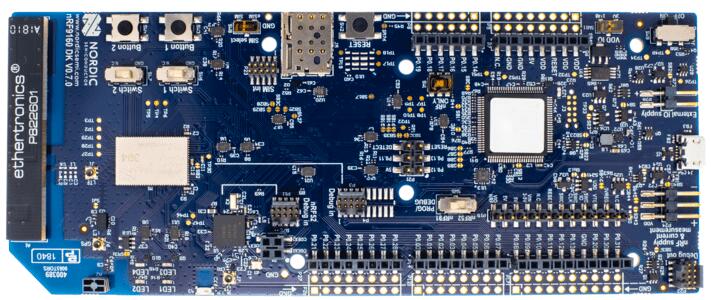nRF9160 DK
Overview
The nRF9160 DK (PCA10090) is a single-board development kit for evaluation and development on the nRF9160 SiP for LTE-M and NB-IoT. The nrf9160dk_nrf9160 board configuration provides support for the Nordic Semiconductor nRF9160 ARM Cortex-M33F CPU with ARMv8-M Security Extension and the following devices:
ADC
CLOCK
FLASH
GPIO
I2C
MPU
NVIC
PWM
RTC
Segger RTT (RTT Console)
SPI
UARTE
WDT
IDAU

nRF9160 DK (Credit: Nordic Semiconductor)
More information about the board can be found at the nRF9160 DK website [2]. The Nordic Semiconductor Infocenter [3] contains the processor’s information and the datasheet.
Hardware
nRF9160 DK has two external oscillators. The frequency of the slow clock is 32.768 kHz. The frequency of the main clock is 32 MHz.
Supported Features
The nrf9160dk_nrf9160 board configuration supports the following hardware features:
Interface |
Controller |
Driver/Component |
|---|---|---|
ADC |
on-chip |
adc |
CLOCK |
on-chip |
clock_control |
FLASH |
on-chip |
flash |
GPIO |
on-chip |
gpio |
I2C(M) |
on-chip |
i2c |
MPU |
on-chip |
arch/arm |
NVIC |
on-chip |
arch/arm |
PWM |
on-chip |
pwm |
RTC |
on-chip |
system clock |
RTT |
Segger |
console |
SPI(M/S) |
on-chip |
spi |
SPU |
on-chip |
system protection |
UARTE |
on-chip |
serial |
WDT |
on-chip |
watchdog |
Additional hardware in v0.14.0+
Starting from v0.14.0, additional hardware is available on the DK:
External flash memory (MX25R6435F, 64 Mb)
I/O expander (PCAL6408A) that can be used to interface LEDs, slide switches, and buttons
To use this additional hardware, specify the revision of the board that should be used when building your application (for more information, see Building for a board revision). For example, to build for nRF9160 DK v1.0.0:
Using west:
west build -b [email protected]
Using CMake and ninja:
mkdir build && cd build
cmake -GNinja -DBOARD=[email protected] ..
ninja
Remember to also enable routing for this additional hardware in the firmware for nRF9160 DK - nRF52840 (see Board controller firmware).
Other hardware features have not been enabled yet for this board. See nRF9160 DK website [2] and Nordic Semiconductor Infocenter [3] for a complete list of nRF9160 DK board hardware features.
Connections and IOs
LED
LED1 (green) = P0.2
LED2 (green) = P0.3
LED3 (green) = P0.4
LED4 (green) = P0.5
Security components
Programming and Debugging
nrf9160dk_nrf9160 supports the Armv8m Security Extension, and by default boots in the Secure state.
Building Secure/Non-Secure Zephyr applications with Arm® TrustZone®
Applications on the nRF9160 may contain a Secure and a Non-Secure firmware image. The Secure image can be built using either Zephyr or Trusted Firmware M [4] (TF-M). Non-Secure firmware images are always built using Zephyr. The two alternatives are described below.
Note
By default the Secure image for nRF9160 is built using TF-M.
Building the Secure firmware using Zephyr
The process requires the following steps:
Build the Secure Zephyr application using
-DBOARD=nrf9160dk_nrf9160andCONFIG_TRUSTED_EXECUTION_SECURE=yin the application project configuration file.Build the Non-Secure Zephyr application using
-DBOARD=nrf9160dk_nrf9160_ns.Merge the two binaries together.
Building the Secure firmware with TF-M
The process to build the Secure firmware image using TF-M and the Non-Secure firmware image using Zephyr requires the following action:
Build the Non-Secure Zephyr application using
-DBOARD=nrf9160dk_nrf9160_ns. To invoke the building of TF-M the Zephyr build system requires the Kconfig optionBUILD_WITH_TFMto be enabled, which is done by default when building Zephyr as a Non-Secure application. The Zephyr build system will perform the following steps automatically:Build the Non-Secure firmware image as a regular Zephyr application
Build a TF-M (secure) firmware image
Merge the output binaries together
Optionally build a bootloader image (MCUboot)
Note
Depending on the TF-M configuration, an application DTS overlay may be required, to adjust the Non-Secure image Flash and SRAM starting address and sizes.
When building a Secure/Non-Secure application, the Secure application will have to set the IDAU (SPU) configuration to allow Non-Secure access to all CPU resources utilized by the Non-Secure application firmware. SPU configuration shall take place before jumping to the Non-Secure application.
Building a Secure only application
Build the Zephyr app in the usual way (see Building an Application
and Run an Application), using -DBOARD=nrf9160dk_nrf9160.
Flashing
Follow the instructions in the Nordic nRF5x Segger J-Link page to install and configure all the necessary software. Further information can be found in Flashing. Then build and flash applications as usual (see Building an Application and Run an Application for more details).
Here is an example for the Hello World application.
First, run your favorite terminal program to listen for output.
$ minicom -D <tty_device> -b 115200
Replace <tty_device> with the port where the nRF9160 DK
can be found. For example, under Linux, /dev/ttyACM0.
Then build and flash the application in the usual way.
# From the root of the zephyr repository
west build -b nrf9160dk_nrf9160 samples/hello_world
west flash
Debugging
Refer to the Nordic nRF5x Segger J-Link page to learn about debugging Nordic boards with a Segger IC.
